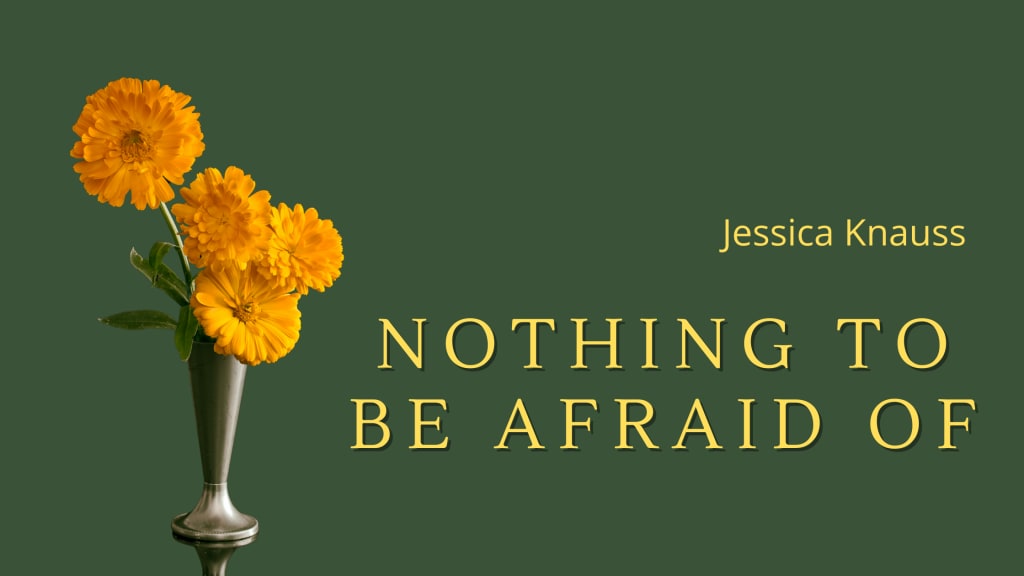Nothing to Be Afraid Of
TW: cemetery, hospice, death

When Tina was six, she went with her grandmother to the cemetery because Tina’s mother refused.
“Marigolds? Monster daisies in a loud color. Not at all right for a cemetery,” Mom said.
“Marigolds were your father’s favorite,” said Grandma. Leaning toward Tina, she whispered, “That means they’re the only flower that should go on your grandpa’s grave.”
It wasn’t his fault he was in the cemetery, Tina figured. He probably hadn’t thought to check on the suitability of marigolds before they moved him there.
She hadn’t known her grandfather. Only that no one especially chose to be in the cemetery.
So Tina and Grandma went together. Grandma wore an open-knit orange sweater over a green dress with fussy white flowers. Tina got to ride in the front seat and watch her grandmother drive deliberately, with great care.
Tina held the marigolds in her lap. She spent most of the journey mastering the balance between keeping them upright and grasping them so hard she bruised the stems.
Grandma opened the car door for Tina, and she let Grandma have the marigolds. But the cemetery at the back of the church gave off a deserted air that kept Tina in the seat.
“Come on, there’s nothing to be afraid of,” said Grandma. She gestured past the rusty gates, and Tina could see a niche in the wall just a few rows in with faded marigolds in its vase. “See? He’s waiting for us.”
Tina felt doubtful. There didn’t seem to be anyone there at all.
She took her grandmother’s hand. The gate latch didn’t have a lock, so it was probably good luck that had kept the place from being vandalized, and the hinges shrieked at them. They walked solemnly through. They stopped before the mid-height niche with the faded marigolds.
Grandma replaced the old marigolds with the new ones in the vase and dusted off the ledge with her hand. “That’s your grandpa’s name,” she said, pointing. “And see this empty space? They’ll put my name there when I pass.”
Pass. It didn’t seem to mean what it meant when Mom or Dad said it.
“Will you throw these in that compost in the corner?” Grandma asked, handing Tina the old marigolds.
She crossed the cemetery thinking half-formed thoughts about the state of the bodies in rows behind the plaques and vases in the wall. No wonder no one wanted to be here. But really no one was there. The sense of desertion was the only thing that never abandoned the churchyard.
She also noticed, before she reached the trash can, that there were flowers of all colors on the other niches. So that couldn’t have been what Mom had really meant.
She waited for Grandma to finish murmuring to Grandpa’s niche, wondering what she thought she was talking to. Tina tried her best to detect her grandfather’s presence, but he was no more there than he was in the other niches, or along the side of the road, or in the kitchen while Mom asked Tina what she thought about the visit. She supposed the flowers were pretty.
It wasn’t hurting anyone, and it was a good chance to chat about anything on her mind, so Tina went with Grandma every time she asked, sometimes as often as once a week.
Then Tina got busy with school and only went with Grandma on special occasions, like Grandpa’s birthday or Thanksgiving. Then Tina went to college a three-stop plane ride away, and the visits to the cemetery only happened in the summer when Tina wasn’t working.
Grandma didn’t seem entirely like herself during winter break of Tina’s junior year. A couple of weeks before the spring semester ended, Mom called to say her mother had been transferred to inpatient hospice.
Tina took four planes home the next day. The hospice courtyard had a burbling fountain shaded by trees where songbirds lived. The hallways were decorated in warm colors and weren’t too long. Tina might’ve thought it was someone’s large, mazelike house.
She sat next to Grandma’s bed. The marigolds she’d sent ahead were in a clear vase on the bedside table. Grandma appeared to be resting in a normal bed, but they’d told Tina she’d been unresponsive since that morning. So it wasn’t so much rest as unconsciousness. The hospital gown on Grandma’s body was the only clue as to what was really going on in that room.
One of the nurses said, “I think they listen to everything.”
Tina felt Grandma’s presence as strongly as if she were awake and carrying flowers to the cemetery, so she talked to her about her university and how far away “the real world” seemed. Tina didn’t feel prepared to face so many unknowns in only a year’s time. Talking to Grandma always made the world less scary.
When night fell, it was time for quiet. Tina stayed at Grandma’s side in spite of repeated advice from the nurses and Mom and Dad that she should get some rest. Tina would rest when Grandma did.
That first night, with a full moon streaming through the sheer curtains, Grandma stepped out of her body. She arose as naturally as anyone getting out of bed in the morning, in the green dress and orange sweater from their first visit to the cemetery so many years before.
She stood before Tina, silhouetted by the moon. When Tina smiled in recognition and welcome, Grandma sat down next to her as if Tina’s chair were a bench or a couch. She put her arm around Tina and laid her head on her granddaughter’s shoulder.
“I love you, Grandma.”
Grandma didn’t speak, but Tina felt warmth and life emanating from her and felt so comforted that she fell asleep.
Tina went home in the morning to shower and change her clothes, then returned to her grandmother’s side. The next two nights were much the same, with comforting hugs, but less moonlight. The marigolds wilted, but no one removed them.
When Tina returned on the fourth day, the room seemed different. She noticed a pair of sharp-looking scissors on the bedside table that hadn’t been there before. She wondered if a nurse had cut Grandma’s hair. But she looked the same, eyes closed, breathing shallow.
That night, Grandma left her body, as expected, but this time, she wasn’t dressed in that outfit. She didn’t seem to have any clothes at all. She stood before Tina, wisps of cold essence like morning mist.
Grandma didn’t sit next to her, but went to stand in the corner near the door. The difference from the previous nights was palpable.
“Grandma?” Tina whispered.
The voice came from nowhere and resonated around the room. “That person doesn’t exist.”
It was a strange sentence, but Tina looked at the body on the mattress and understood.
It was the same feeling she’d had in the cemetery all those hundreds of times. Grandpa wasn’t there, and neither were any of the other people with their names on plaques.
She turned back to the figure in the corner. It nearly wasn’t there at all, see-through and wavering, and yet that was where Tina felt Grandma’s presence.
The spirit pointed toward the body. A thread so thin she could only see its gleam, a reflection of the tenuous moonlight, drew between body and spirit. In its vaporousness, it seemed like the most solid thing Tina had ever laid eyes on.
The scissors on the bedside table glowed with the same type of light as the thread, and Tina realized it might never have existed in the physical world. There was only one thing to do.
She gripped the scissors and tried them out. They clamped down with a terrifying finality.
“I have to let you go,” she whispered. Hands shaking, she snipped the thread.
It disappeared. The spirit in the corner increased in brightness and almost seemed to become solid for an instant. The hazy face showed Tina a blissful smile. Then the form scattered, millions of points of light all around the room. And it was gone.
There were no scissors in Tina’s hand or on the bedside table. With tears streaming down her face, Tina touched the cheek that had been her grandmother’s. Of course, the empty shell gave no response.
Tina walked down the brightly lit hallway to the reception desk and asked for a nurse. The receptionist said, yes, someone would be there right away, and to go back and be with her loved one. Tina supposed the receptionist meant that she should return to the room with the body.
Treading heavily back down the hallway, Tina remembered the untainted joy of the spirit’s smile and its scattered release. A feeling of satisfaction, a job well done, overwhelmed her selfish sadness.
She turned on the light in the room. The marigolds, which had been wrinkled and faded, now stood straight, fully blooming.
About the Creator
Jessica Knauss
I’m an author who writes great stories that must be told to immerse my readers in new worlds of wondrous possibility.
Here, I publish unusually entertaining fiction and fascinating nonfiction on a semi-regular basis.
JessicaKnauss.com






Comments
There are no comments for this story
Be the first to respond and start the conversation.